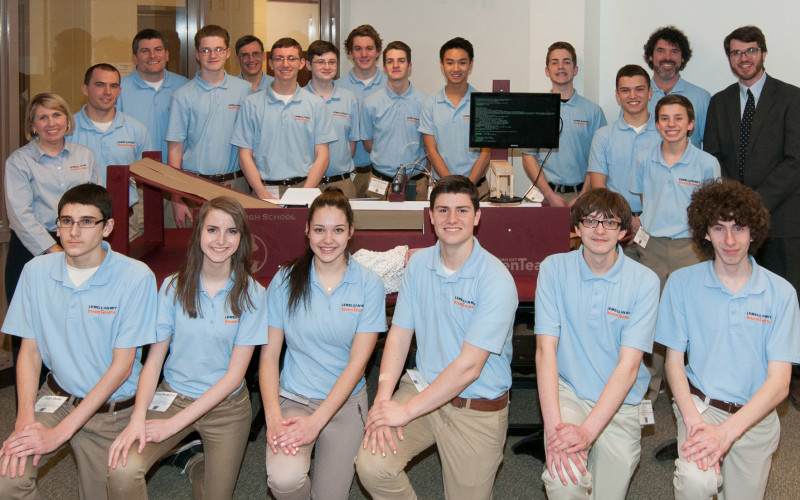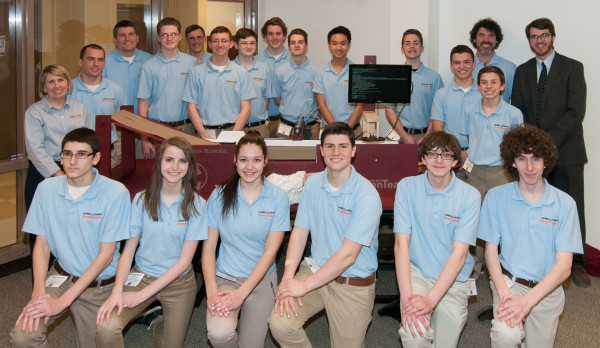Student team and Christiana Care partner to engineer safety improvements


Christiana Care is partnering with a team of 15 engineering students at Concord High School to build a detection system that uses magnetic technology to warn of potentially dangerous objects hidden in textiles before they are sorted and cleaned in the hospital laundry.
The innovative project has been awarded a $10,000 grant from the Lemelson-MIT InvenTeam Program at the Massachusetts Institute of Technology in Boston. InvenTeams are teams of high school students, teachers and mentors that receive grants for coming up with creative solutions to problems while making use of science, technology, engineering and math.
“I am impressed with the students’ effort and design, and grateful that Christiana Care gave us an authentic real-world problem to solve,” said Concord engineering and design teacher Jordan Estock, who is guiding the InvenTeam.
The national program was set up to encourage invention as public service and inspire a new generation of Thomas Edisons. This is the first time, since the Lemelson-MIT program was begun in 1994, that a Delaware InvenTeam has been awarded such a grant.
“This is a really cool opportunity,” said Justin DiGiovanni, a Concord High InvenTeam sophomore. “Not a lot of people have a chance of taking part in an invention and we’re pretty enthusiastic about it.”
Justin’s father is John DiGiovanni, a senior systems engineer on the Christiana Care IT Application Development team. He is a mentor on the project, along with Chuck McKenna, a senior systems analyst. They give much of the credit for the project success to Estock and Guy Defibaugh, textile services director, for collaborating to enhance student learning and hospital safety.
In looking for a Christiana Care project to tackle, Estock met with Defibaugh and members of his staff to talk about how laundry is sorted. Estock learned that Christiana Care handles its own laundry with a six-team staff that sorts up to 35,000 pounds of linens day, including bedding and surgical linen.
After large carts of laundry are dumped on a conveyor belt, bags of laundry are opened and separated by staff into 22 sorting categories. But sometimes items such as patient tracking badges, surgical tools and needles are inadvertently bundled with laundry. On the conveyor belt some of these objects present a danger to the sorting team.
“If sharp items are not spotted, staff can be injured, and that is the last thing we want,” said Defibaugh, adding that if the
objects make it into washers, they can damage machines. “We need something that will work efficiently without holding up the system.”
One solution Defibaugh explored is for staff to use magnetic wands to detect the objects. But the wands are impractical and time-consuming given that the average staff member sorts close to 800 pounds of laundry per hour.
Instead, Estock and the InvenTeam have proposed that the conveyor carry the laundry under a magnetic arch, which his InvenTeam students are designing. If a needle or other metal object is detected by the magnetic field, an alarm will ring and a pneumatic arm will swing out to move the item off the conveyor. Then the textiles can be safely handled.
The Lemelson-MIT grant, which is one of 15 awarded to U.S. school projects this year, is funding costs associated with the laundry design. The Concord High InvenTeam students, who began work on the project last summer, have broken up into several teams to focus on crucial aspects of the invention.
In the process, they have visited the hospital, talked with employees and are learning about computer coding, electronics, engineering, teamwork and what it takes to run a small business, said Estock.
“Partnering with a community leader like Christiana Care creates many positive outcomes on many different levels,” said John DiGiovanni. “Not only are these students solving a problem in the hospital, but the project is providing them encouragement to pursue careers in engineering, software design, health care and more. This is something the students will remember their whole lives, and it’s a win-win for everybody.”